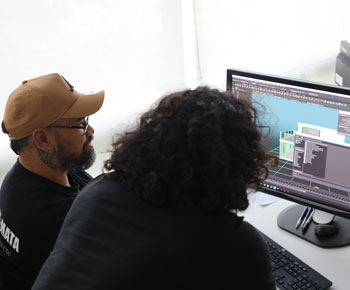Digital technology
Digital technology, and the skills associated with information and communications technology (ICT), provide significant opportunities for the Waikato region to realise productivity gains and increased GDP. In addition, digital technology also provides significant opportunities to reduce carbon emissions across all industries.
On this page

Our approach
The Waikato RSLG believes that supporting digital technology – and particularly agritech development and adoption – must be integral to the region’s future workforce and skills development. It views support to increasing agritech education and training in the region as fundamental to its role, noting that agritech in dairy remains a surprisingly small sector in New Zealand.
Frontier firms: Four industry case studies. Working paper 2021/02 [PDF 1MB](external link) — New Zealand Productivity Commission
2020 research by Te Waka found that most Waikato technology businesses are small, with 65% having a turnover of $5 million or less. An additional 20% of survey respondents reported revenues of over $20 million, with several far exceeding this level. These large anchor employers – such as Gallagher and Waikato Milking Systems – play an important role in developing the region’s technology workforce, by identifying and growing the capability needed for innovation.
Survey reveals size and shape of the Waikato Tech Sector(external link) — Te Waka Anga Whakamua Waikato
Waikato RSLG member and tech professional, David Hallett, says:
“The technology sector spans our entire economy. Whether you’re in agriculture, finance, health or some of other industry, so much of what you do is underpinned, enabled and delivered through technology… the fact that we grow really cool businesses whilst generating excellent trade surpluses in export revenue is one of the reasons I love it. It also makes life easier and fun for many people and enables us to become a knowledge economy rather than just a process or manufacturing economy. It’s amazing in terms of the things that you can do and the value that you can create.”
Tips for technology start-ups(external link) — Company-X
Key insights
Marrying the Waikato primary sector, manufacturing, and transport and logistics capability with technology will position the region’s workforce well for the future. High-tech manufacturing and advanced manufacturing are regional strengths, largely because of their role as inputs to the existing primary sector eco-system. The region’s technology industry is already leveraging significant opportunities in areas such as agritech, artificial intelligence, machine learning, and robotics, that all build on these strengths.
Waikato technology industry employers will need to continue to attract and retain skilled workers from other regions and offshore by promoting their agritech capability, as well as promoting the region’s lifestyle offering. Local employers told the Group that their technology experts are mobile and can be based anywhere in the world – and that post-COVID-19, the converse is increasingly true – Waikato-based technology workers are now sought after and employed by companies all around the world.
Regional leadership and investment in developing the future local technology workforce and leaders is a need and opportunity. This means a dedicated focus on attracting more rangatahi into the industry through clear education and training pathways that are relevant to the region’s future, and through creating more pathways for upskilling of the current workforce.
Improving diversity remains a challenge for technology employers nationally. Māori represent only 4.1% of the workforce, Pasifika 2.8%, and women 27%. A concerted effort will be needed to attract more women, Māori and Pasifika people into the Waikato ICT sector.
Digital Skills For Our Digital Future [PDF 6.8 MB](external link) — NZ Tech
That said, there is growing Māori leadership in the digital technology sector across the Waikato. Te Matarau (the Māori Tech Community), and rangatahi Māori are emerging not only as the future workforce, but also as future leaders and business owners. It is important to ensure that whānau understand the pathways and future opportunities for rangatahi in the digital technology sector.
Digital technology key action
-
Close the gap between learning and working across the digital/ICT sector.
Case study: TORO Academy
 In November 2021, digital animation design company TORO Studios launched a unique 16-week digital 3D animation course that targeted rangatahi aged 16 years and over. The TORO Academy started with 18 rangatahi and celebrated its first cohort of 15 graduates in March 2022. The programme sought to attract more Māori into the 3D animation sector with a view to develop the talent pool at a local level. The programme combined a Te Ao Māori approach to learning with lots of practical hands-on learning through opportunities to work on real industry jobs.
In November 2021, digital animation design company TORO Studios launched a unique 16-week digital 3D animation course that targeted rangatahi aged 16 years and over. The TORO Academy started with 18 rangatahi and celebrated its first cohort of 15 graduates in March 2022. The programme sought to attract more Māori into the 3D animation sector with a view to develop the talent pool at a local level. The programme combined a Te Ao Māori approach to learning with lots of practical hands-on learning through opportunities to work on real industry jobs.
TORO Academy drew on the support of Māori animators in the industry to provide industry insights and facilitate mater classes. The first five weeks were delivered online with the remainder of the course taking place in a purpose-built studio at Te Wānanga o Aotearoa’s Mangakōtukutuku campus in Hamilton. At the online graduation ceremony in March 2022, TORO Academy Kaiako, Nikora Ngaropo, spoke about how the mentoring support that the students received during the programme would continue during the internships. Of the 15 graduates, 10 have been offered internships.
When asked why it was hard to attract rangatahi Māori to the creative tech sector, CEO and Founder of Arataki Systems, Lee Timutimu said that whānau needed support in understanding the value of encouraging their tamariki into the sector. Lee suggested that the intangible nature of the tech industry could be a barrier to understanding and it was crucial to educate whānau about the benefits of the sector as a valuable career. Lee demonstrated this by drawing a comparison of average wage in New Zealand of $52,500 against the starting base salary in the tech sector of $73,000.

